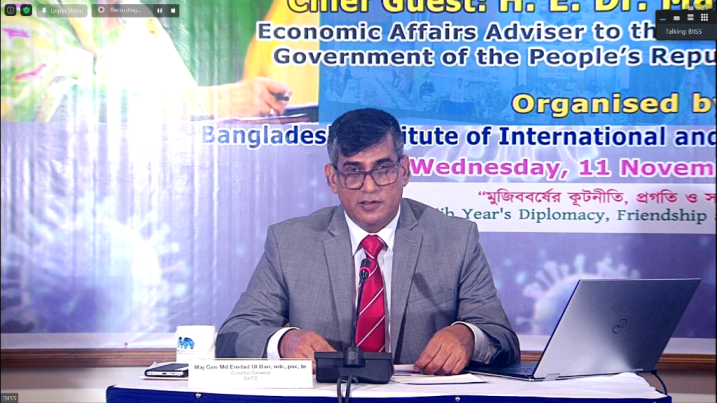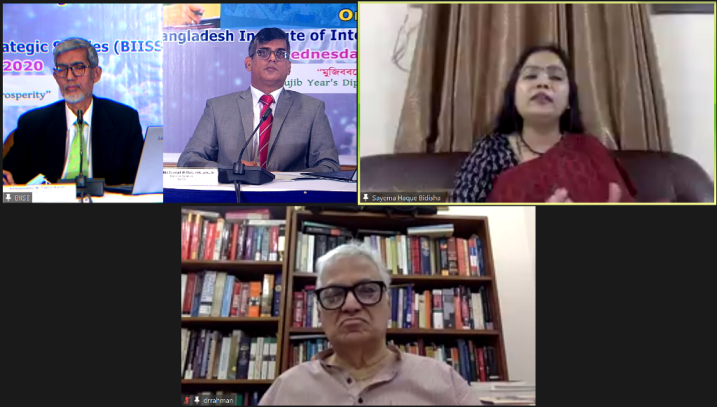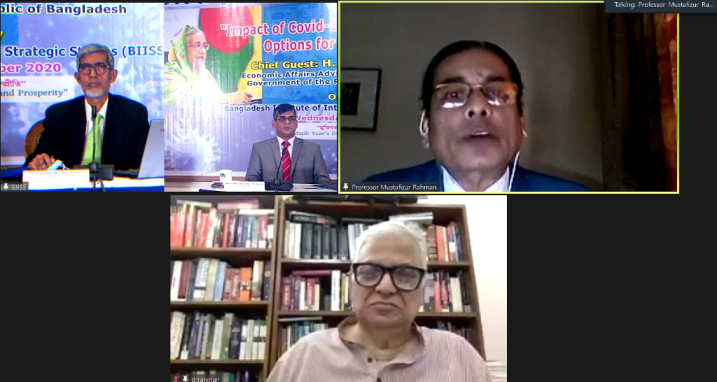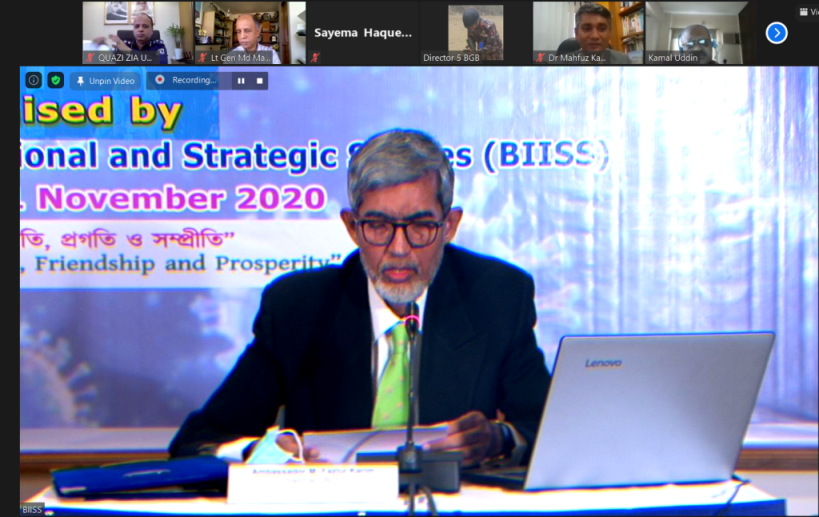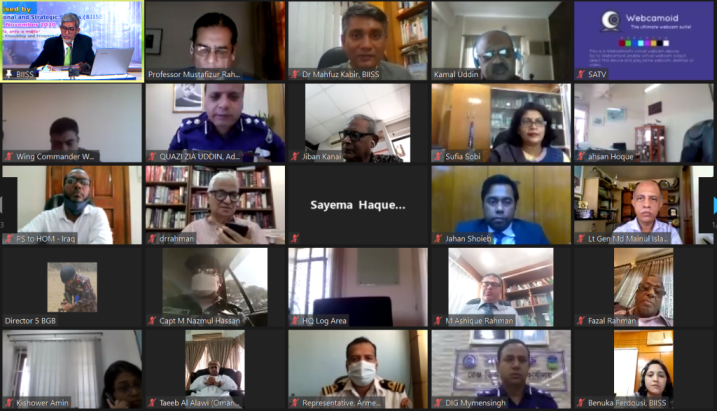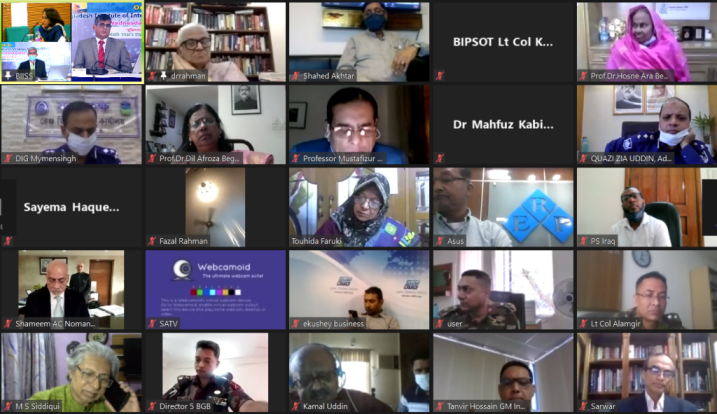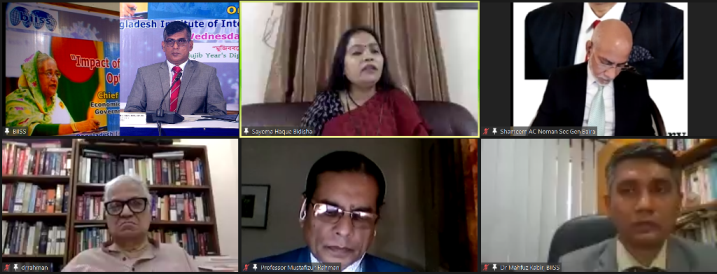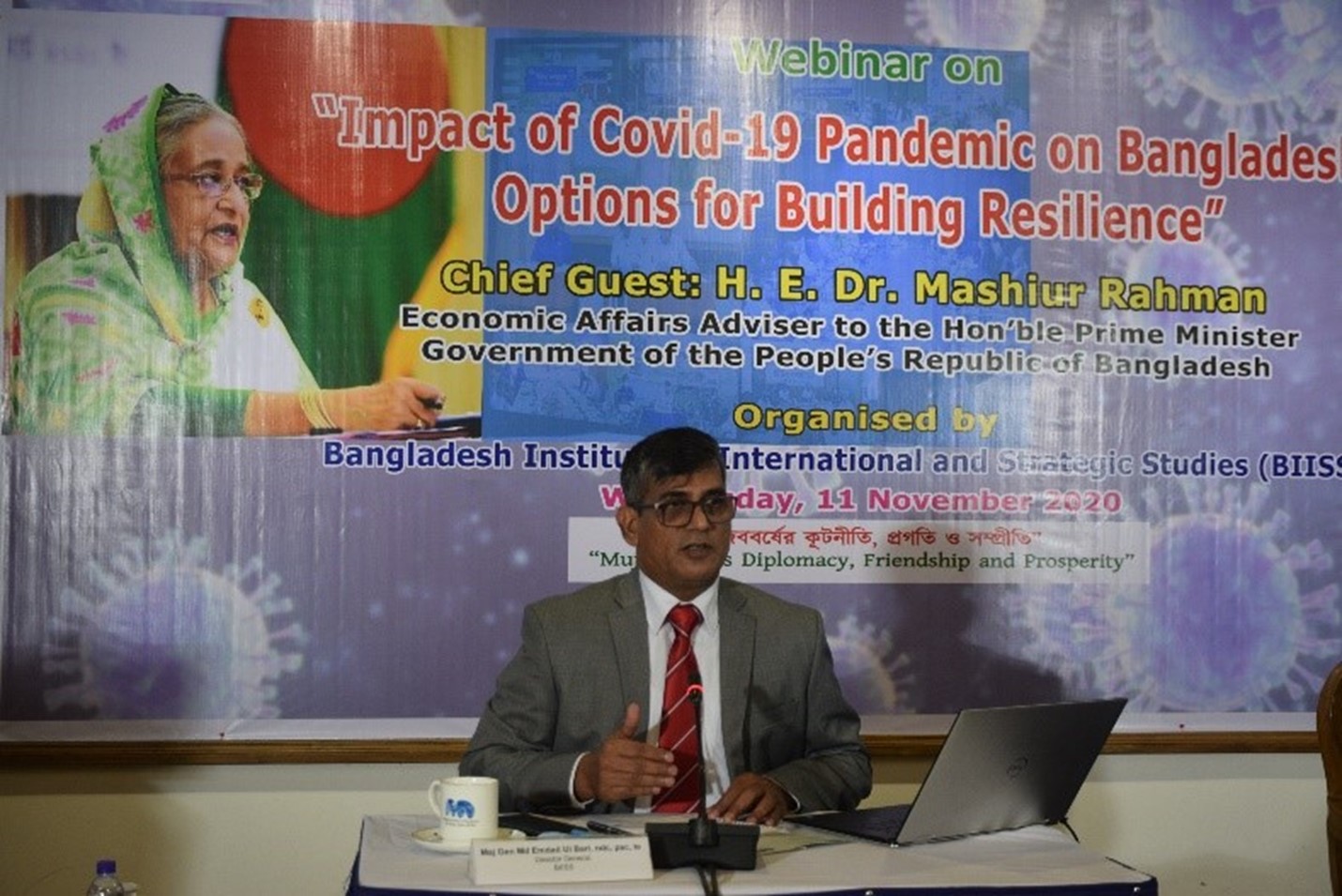Webinar on "Impact of Covid-19 Pandemic on Bangladesh: Options for Building Resilience"
DATE: 2020-11-11
Bangladesh Institute of International and Strategic Studies (BIISS) organized a Webinar on “Impact of Covid-19 Pandemic on Bangladesh: Options for Building Resilience” on 11 November 2020 from 1100 to 1300 hours. His Excellency Dr. Mashiur Rahman, Economic Affairs Adviser to the Hon’ble Prime Minister, was present at the webinar as the Chief Guest. Four eminent personalities presented their views in the working session. The event was chaired by Ambassador M. Fazlul Karim, Chairman, BIISS. Major General Md Emdad Ul Bari, ndc, psc, te, Director General of BIISS delivered the opening and closing remarks.
While chairing the session, Ambassador M. Fazlul Karim, Chairman of BIISS, highlighted various initiatives of the government to combat Covid-19 and how those initiatives help to boost and maintain the country’s economy even a midst of pandemic. He stressed on the importance of a global response to better prepare the countries in the face of such global pandemic and opined that there should be enhanced assistance and support from multilateral organisations and financial institutions as well as from bilateral sources to the developing countries like Bangladesh.
In the welcome address, Major General Md Emdad Ul Bari, ndc, psc, te, Director General of BIISS said that most of the countries who have reviewed their security policies in the last 10-15 years have endorsed “epidemics” as a credible threat to national security. In the case of Bangladesh, the country has done reasonably well in dealing with the situation so far. He gave special thanks to the decisive and proactive leadership of the Hon’ble Prime Minister who took the intervention promptly in this unprecedented time. The General mentioned that among other things, the declaration of a huge stimulus package amounting to 3.7 per cent of the country’s GDP, a share higher than other South and Southeast Asian countries is praiseworthy. This was primarily intended to support the salary of workers of export-oriented industries, to provide working capital to domestic industrial and service enterprises, to provide cheap credit to agricultural sectors, and to support massive social safety-net programs. However, Bangladesh needs to further augment and orchestrate the efforts to invigorate economic activities, global trade, overseas employment, and foreign direct investment in the years to come.
Professor Dr. Mustafizur Rahman, Distinguished Fellow, Centre for Policy Dialogue delivered a speech on Domestic Market and International Trade where he highlighted the implications of employment creation, institution building, good governance, equitable distribution of growth and role of public investment, and importance of micro-finance for resilient recovery from the adverse impacts of Covid-19. He also suggested that, in view of the emergent and anticipated near-term scenario, the government should prioritize digitalization process, negotiating capacity in the context of the country’s foreign relations and proactive foreign trade policies and measures. He appreciated for bringing the concept of resilience in the webinar as resilience focuses on long term sustainability of the system.
Dr. Sayema Haque Bidisha, Department of Economics, University of Dhaka spoke on Poverty and Social Security. She discussed the impact of Covid-19 on poverty and social security with instances of urban poverty and poverty in slum areas. She also shed light on the education sector, child nutrition and employment. She expressed that proper education, especially skill development program and training, can ensure employment which can provide with income generations resulting in the reduction of poverty ultimately.
Mr. Shameem Ahmed Chowdhury Noman, Secretary General, BAIRA & Proprietor, Sadia International discussed the situation of Manpower Export and how the sector is affected by the Covid-19 pandemic. He pointed out the challenges faced by migrant workers in particular and the entire sector in general due to the pandemic and highlighted what sort of assistance the industry needs from the government and other stakeholders.
Dr. Mohammad Mahfuz Kabir, Research Director, BIISS presented on FDI and Macro Economy. He stated that Covid-19 suddenly started to decelerate the entire economy. To recover the economy, he suggested to rebuild the economy, regain the confidence of the foreign investors, introduce new social security programmes, re-skilling migrant workers and provide support for the marginalized people.
The Chief Guest H. E. Dr. Mashiur Rahman, Economic Affairs Adviser to the Hon’ble Prime Minister in his address, touched upon all the topics discussed in the webinar and provided his analysis on the overall economic implications of the Covid-19 pandemic. He emphasized on export diversification, remittance, FDI, and highlighted some key issues related to service sectors like healthcare and education. He concluded by stressing on the need to enhance private investment and effective implementation of the initiatives taken during the period of the pandemic.
The webinar was followed by a lively open discussion where senior officials from the Bangladesh government, retired ambassadors, representatives from different foreign missions, businessmen, members of academia, researchers, faculties of various universities and media representatives took part and made their observations and thoughts on the issue. The speakers and participants acknowledged and appreciated various government initiatives to combat Covid-19, at the same time, stressed on the need for coordinated efforts by government, private sectors and all concerned stakeholders for building resilience against present and any such future menaces.

